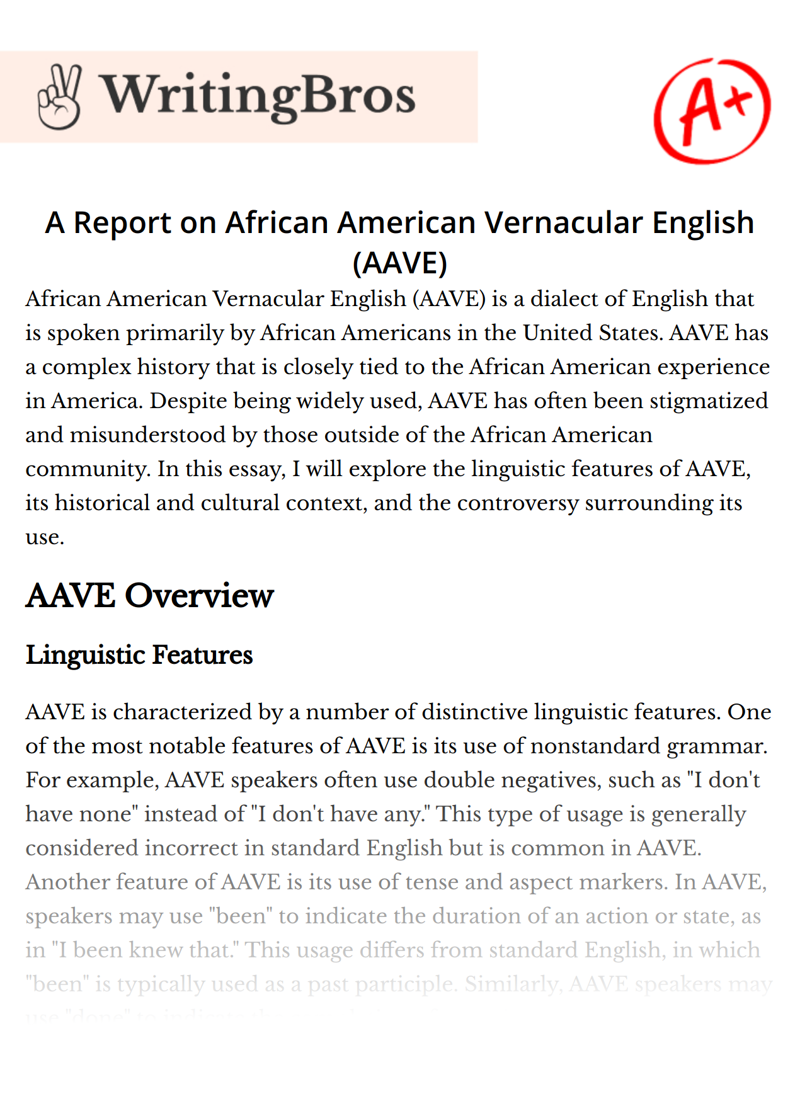A Report on African American Vernacular English (AAVE)

Table of contents
African American Vernacular English (AAVE) is a dialect of English that is spoken primarily by African Americans in the United States. AAVE has a complex history that is closely tied to the African American experience in America. Despite being widely used, AAVE has often been stigmatized and misunderstood by those outside of the African American community. In this essay, I will explore the linguistic features of AAVE, its historical and cultural context, and the controversy surrounding its use.
AAVE Overview
Linguistic Features
AAVE is characterized by a number of distinctive linguistic features. One of the most notable features of AAVE is its use of nonstandard grammar. For example, AAVE speakers often use double negatives, such as "I don't have none" instead of "I don't have any." This type of usage is generally considered incorrect in standard English but is common in AAVE.
Another feature of AAVE is its use of tense and aspect markers. In AAVE, speakers may use "been" to indicate the duration of an action or state, as in "I been knew that." This usage differs from standard English, in which "been" is typically used as a past participle. Similarly, AAVE speakers may use "done" to indicate the completion of an action, as in "I done told you."
AAVE also features distinctive vocabulary, such as "ain't" instead of "isn't" or "aren't." This type of usage is often viewed as uneducated or lazy, but it is a part of AAVE and has a long history in African American English.
Historical and Cultural Context
The development of AAVE is closely tied to the history of African Americans in the United States. During the era of slavery, African Americans were denied access to formal education and often had to communicate with each other using pidgin languages or Creole languages that combined elements of African languages and English.
After slavery was abolished, many African Americans continued to face significant barriers to education and economic advancement. As a result, AAVE became an important way for African Americans to communicate with each other and to express their cultural identity.
Despite the cultural significance of AAVE, it has often been stigmatized and devalued by those outside of the African American community. AAVE speakers have been criticized for their supposed lack of education and intelligence, and AAVE has often been associated with negative stereotypes about African Americans.
Controversy
The controversy surrounding AAVE centers on questions of language and identity. Some linguists argue that AAVE is a legitimate dialect of English with its own rules and conventions, and that it should be recognized and valued as such. Others argue that AAVE is simply a collection of errors and deviations from standard English, and that it should be corrected or eliminated.
One of the challenges in this debate is that language is closely tied to identity and culture. For many African Americans, AAVE is a central part of their cultural identity, and they view it as a source of pride and connection to their heritage. To suggest that AAVE is incorrect or inferior can be seen as an attack on their identity and culture.
Conclusion
AAVE is a complex and important dialect of English that is closely tied to the African American experience in the United States. Despite its significance, AAVE has often been stigmatized and misunderstood by those outside of the African American community. As we continue to explore the diversity of languages and dialects spoken in the United States, it is important to recognize and value the contributions of AAVE and to resist the temptation to devalue or dismiss it based on cultural biases or misunderstandings.
References
- Rickford, J. R. (1999). African American Vernacular English: Features, evolution, educational implications. Oxford University Press.
- Baugh, J. (2000). Beyond Ebonics: Linguistic pride and racial prejudice. Oxford University Press.
- Smitherman, G. (2006). Word from the mother: Language and African Americans. Routledge.
- Green, L. (2002). African American English: A linguistic introduction. Cambridge University Press.
- Labov, W. (1972). Language in the inner city: Studies in the Black English vernacular. University of Pennsylvania Press.
- McWhorter, J. H. (2018). Talking back, talking black: Truths about America's Lingua Franca. Bellevue Literary Press.
Cite this Essay
To export a reference to this article please select a referencing style below

